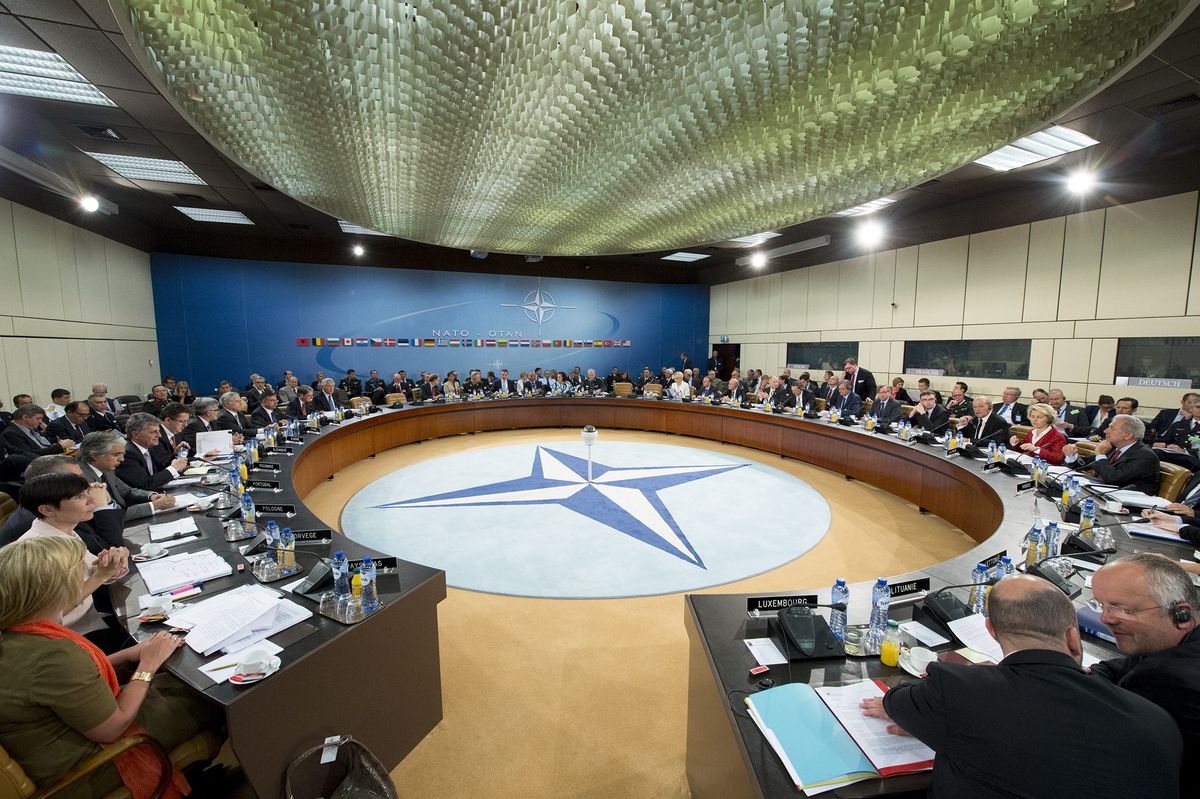
Summary
At the NATO Defence Ministerial Meeting in Brussels on February 13-14, NATO Defence Ministers and officials discussed pressing security challenges, reviewed past and ongoing operations and identified efforts to strengthen the Alliance.
In our first Quarterly Security Briefing, Friends of Europe addressed the results and outcomes of the Ministerial Meeting and their implications for the transatlantic security alliance in 2019. The debate, held under the Chatham House Rule, focused on four essential topics: the question of burden sharing within the alliance, the “Four Thirties” Readiness initiative, the future of the INF Treaty as well as the current situation in Afghanistan.
In order to strengthen the alliance and to improve the effectiveness of its structures, NATO members have decided to take several actions. Following the 2014 Wales summit, NATO members had agreed to increase their financial contribution to meet the target of spending 2% of their annual GDP on defence and 20% of the overall defence budget on capabilities until 2024. $40bn has been added to the budget and until 2020 another $100bn are expected to be contributed by Canada and European allies.
Furthermore, in July 2018, allies committed to the “Four Thirties” Readiness Initiative, which will ensure 30 combat ships, 30 land battalions and 30 air squadrons, are ready to deploy within 30 days or less. With regard to future capabilities, participants stressed the importance of early involvement of the defence industry in the planning process and increased investment in military personnel.
Following the decision of the US and Russia to withdraw from the Intermediate-Range Nuclear Forces Treaty (INF Treaty), it is now of utmost importance to restore Russian compliance and return both parties to the treaty within the next six months. To achieve this aim, NATO will rely on its so-called ‘three Ds’: (effective) deterrence, defence and dialogue. Up to now, there is no blueprint to replace the INF Treaty, but a new treaty should ideally include other nuclear powers. Participants also pointed to the growing risks posed by nuclear proliferation. NATO nuclear powers need to avoid using threatening language to prevent further escalation.
With regard to the mission in Afghanistan, NATO allies have declared that they started the operation together and will, therefore, take a joint decision on future engagement in Afghanistan. This declaration came after the US announced progress in its peace talks with the Taliban and possible future withdrawal of US forces from the country.
For the Leaders Meeting in London in December, NATO officials hope that significant progress will have been made in terms of cash, capabilities and contributions (3 Cs) in order to improve its responsiveness, readiness and reinforcement (3 Rs).
About
The increasing pace of change in international security makes the ability to schedule debriefings quickly to react to current affairs an important tool for central players on peace, security and defence issues. The aim of Friends of Europe’s quarterly security briefings is to react and clarify topical issues at a given moment. Our briefings reinforce a security community in Brussels that meets regularly to discuss key challenges to security.
Our first quarterly security briefing will address the results and outcomes of the NATO Defence Ministerial Meeting and uncover the 2019 Munich Security Conference. This briefing will offer an opportunity to clarify, discuss and evaluate key topical issues regarding the future cooperation on European and transatlantic defence and security.
Related content:
Event summary
IMAGE CREDIT: CC/Flickr – NATO North Atlantic Treaty Organization
Schedule
Our first quarterly security briefing will take place right after the NATO Defence Ministerial Meeting. We will bring together small group of experts and decision-makers from across the public-private divide for a candid discussion on the outcomes of the meeting. The aim will be to clarify, discuss and evaluate key topical issues regarding the future cooperation on European and transatlantic defence and security. This briefing will offer an opportunity to immediately scrutinize agreements, results and decisions including their implications. Taking place on the morning before the annual Munich Security Conference, this briefing will also declassify relevant topics on the MSC-agenda and identify positions and directions of key NATO and EU representatives.
- What are the main security challenges and threats to the transatlantic alliance in 2019 and beyond?
- What are the strategic priorities of both NATO and EU?
Speaker
Patrick Turner
NATO Assistant Secretary General for Defence Policy and Planning
Moderated by
Jamie Shea
Senior Fellow for Peace, Security and Defence at Friends of Europe, and former Deputy Assistant Secretary General for Emerging Security Challenges at the North Atlantic Treaty Organization (NATO)
Speakers

Senior Fellow for Peace, Security and Defence at Friends of Europe, and former Deputy Assistant Secretary General for Emerging Security Challenges at the North Atlantic Treaty Organization (NATO)

NATO Assistant Secretary General for Defence Policy and Planning
Activities
From ambition to action: building Europe’s Defence Union
Past event In person

- Area of Expertise
- Peace, Security & Defence
EU-Western Balkans Summit 2025
Next event In person & Livestreamed

- Area of Expertise
- Peace, Security & Defence
Frontline Voices: renewing the women, peace and security agenda
Past event Online

- Area of Expertise
- Peace, Security & Defence
Frontline Voices: diagnosing the disconnect – The Women, Peace and…
Past event Online

- Area of Expertise
- Peace, Security & Defence
Defence Science and Technology: can NATO maintain its edge as its…
- Category
- #CriticalThinking
- Author
- By Jamie Shea
The next EU budget: increasing defence resources for strategic autonomy
- Category
- #CriticalThinking
- Author
- By Daniel Dăianu
How Russia fabricates reality to feign innocence while bombing civilians
- Category
- Area of Expertise
- Peace, Security & Defence
What happens to a kid abducted by Russia? Survivors and detention camp maps…
- Category
- Area of Expertise
- Peace, Security & Defence

- Area of Expertise
- Peace, Security & Defence

- Area of Expertise
- Peace, Security & Defence

- Area of Expertise
- Peace, Security & Defence

- Area of Expertise
- Peace, Security & Defence
Continue
the debate on
- Debating Europe
